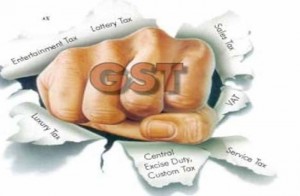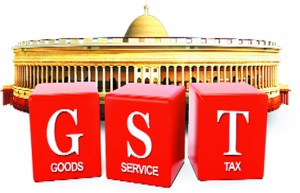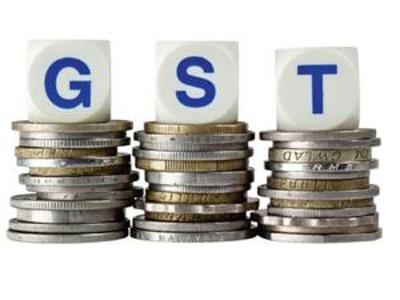In this blog post, Neha Tandon, a student at Svkm’s Pravin Gandhi College of Law, Mumbai and pursuing a Diploma in Entrepreneurship Administration and Business Laws from NUJS, Kolkata, analyses the recently introduced GST Bill.
What is GST?
Goods and Services Tax (GST) will be a comprehensive nationwide indirect tax on the manufacture, sale, and consumption of goods and services throughout the territory of India.
GST is a tax which will be collected at every stage of purchase or sale of goods or services based on the input-tax credit method and would make not just manufacturing but also interstate transportation of the goods much more efficient.
Salient Features of the GST Bill
- The goods and services tax will be applicable on the supply of all goods & services.
- It will not only serve the Centre but also the state it will be a dual GST levying on a common base.
- The GST, which will be levied at the state level, will be termed as State Goods and Services Tax and the GST, which will be levied at Centre level, will be termed as Centre Goods and Services Tax.

- The CGST and the SGST will be levied at a rated which will be mutually agreed upon by the Centre and the state.[1]
- The GST will replace taxes which are imposed by the Centre such as Duty of Excise, Additional Duties of Excise (Goods of special importance), Additional duties of excise (textile and textile produce), additional duties of customs, Special additional duty of customs, service tax and surcharges.
- The state taxes that will be replaced within the GST are central sales tax, luxury tax, entry tax, entertainment tax which shall not be imposed on local bodies, taxes on advertisements, taxes on lotteries, taxes on betting and gambling, state cease and surcharges related to the supply of goods and services. [2]
- GST will apply to 5 petroleum products namely
- Petroleum crude
- High-speed diesel
- Motor spirit (petrol)
- Natural gas
- Aviation turbine fuel at later date which is to be decided by the GST council[3]
- The Bill states that the Centre may levy an additional tax of up to 1%, on the supply of goods in the course of inter-state trade for two years or longer, as per the recommendation of GST council.
- Alcohol is likely to be exempted from GST
- Direct tax such as corporate tax will be exempted from GST
- The government is discussing the combined GST and is expected to be around 14-16%.
Introduction to the GST Bill
In 2006-2007 the government started making efforts to introduce the GST ACT. The enactment process finally began on 10th of November 2009 by the issue of white paper for the purpose of discussion on GST.
The GST bill which is also known as the constitutions 122nd amendment bill was introduced in the Lok Sabha on 19th of December in the year 2014 and was passed by the Lok Sabha on 6th of may, 2015.
As of now, the GST bill is waiting for its approval from the Rajya Sabha.
In the case of CGST, the location of the supplier and the recipient within the country is immaterial. And in the case of SGST, it would be chargeable only when the supplier and the recipient both are located within the state. In place of CST, the government is proposing to introduce IGST, which is to levy a tax on inter-state supply of goods and services which consist of SGST and CGST.
Steps Required for the Implementation of the GST Bill
The GST bill has been pending in the Rajya Sabha for a long time, and with the Congress which is refusing to come on board. Unlike the constitutional amendments the goods and services tax bill will be required to be passed by simple majority.
Finance Minister Arjun Jaitley has expressed that he is confident that the GST bill will be passed in the monsoon session of Rajya Sabha. [4] After that, at least 50% of the states legislatures have to ratify the constitutional amendments[5]. Both the Lok Sabha and the Rajya Sabha have to pass the GST bill, and the states will also be required to pass their own GST bills. The total number of votes required for the passing of the GST bill is 164 if all the members are present in the house and voting and the two-third majority mark will strike to 155 if the AIDMK’s 13 members abstain. [6]
However, the Congress party wants the GST rate to be a creation of an independent mechanism and to resolve the disputes which arise between revenue sharing among the states.
Benefits of the GST Bill for India
The introduction of goods and services tax bill will completely reform the system of indirect tax in India. Bringing together various central and state taxes into a single tax which will benefit the common national market. Experts are of the view that the introduction of GST will boost India’s economic development and also improve tax collections.
It will be a huge benefit for the consumers as the burden of tax on the interstate logistics will become cheaper. It will also help in building a corruption-free tax administration. As far as the states are concerned, it has been estimated that India will gain $15 billion[7] A year by implementing the goods and services tax, and it will also promote exports and raise employments. For individuals and companies, it is beneficial to Centre and State tax will be collected at the point of sale, both Centre and state goods and services tax will be charged on the manufacturing cost. The major benefit for the individuals will be that the prices of will come down. Lower the prices, more the consumption which will help companies.
As of now many goods are sold within the state so that paying the CST can be avoided. By the introduction of GST, several products which are of good quality manufactured in one part of the country will find more market because there will be no CST and no entry tax.
As a whole Goods and Services tax will be beneficial for India as it will it bring uniformity in the taxation system in the country.
[divider]
References:
http://www.legalservicesindia.com/article/article/silent-features-of-gst-bill-2016-2116-1.html
https://caasmeet.wordpress.com/2015/10/10/gst-steps-for-preparedness-for-implementation/
https://medium.com/@legalnow_in/5-things-you-need-to-know-about-the-gst-bill-9f5ee83f7ae6#.7zwah07xc
http://www.prsindia.org/uploads/media/Constitution%20122nd/Brief–%20GST,%202014.pdf
[1] Manjunath Kakkalameli, Silent features of GST Bill(23rd June,16) http://www.legalservicesindia.com/article/article/silent-features-of-gst-bill-2016-2116-1.html
[2] Ayushi Sharma, five things you need to know about the GST bill(23rd June,16) https://medium.com/@legalnow_in/5-things-you-need-to-know-about-the-gst-bill-9f5ee83f7ae6#.ag1mkkrv1
[3] http://www.prsindia.org/uploads/media/Constitution%20122nd/Brief–%20GST,%202014.pdf
[4] Arup Roychoudhury, All you need to know about the GST constitutional amendment bill(23rd June 2016) http://www.business-standard.com/article/economy-policy/all-you-need-to-know-about-the-gst-constitutional-amendment-bill-116060300761_1.html
[5] Supra
[6] Wheels of RS turning for govt on GST bill(23rd June,16) http://timesofindia.indiatimes.com/india/Wheels-of-RS-turning-in-favour-of-govt-on-GST-bill/articleshow/52842513.cms
[7] What is GST(23rd June 2016) http://www.gstindia.com/about/
 Serato DJ Crack 2025Serato DJ PRO Crack
Serato DJ Crack 2025Serato DJ PRO Crack










 Allow notifications
Allow notifications


